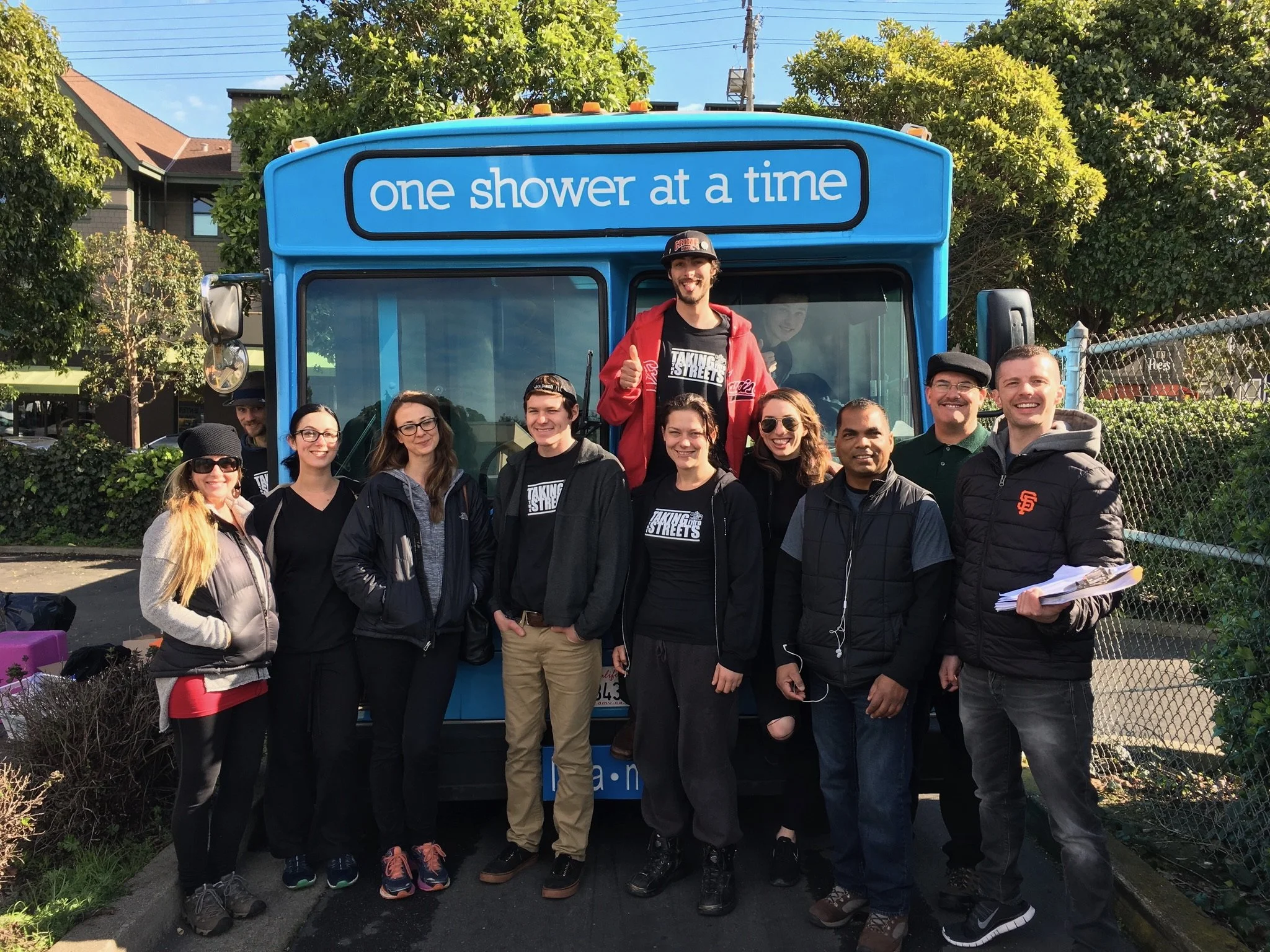Learn how to practice sustainable self-care in service work. From trauma-informed to healing-centered approaches - you can't give what you haven't got.
Read MoreMilitary occupation costs $1.6M daily while housing all of Chicago's unhoused neighbors costs $383K. Discover the shocking math behind America's misplaced priorities and proven housing solutions.
Read More"Radical hope is hope that exists even when we are experiencing the destruction of our culture," writes Jonathan Lear. In times of authoritarianism, violence, and despair, how do we nurture hope? Through a deeply personal story of addiction recovery, spiritual awakening, and 30 years of practice, discover the prayers and tools that sustain radical hope when the world feels broken.
Read MoreDiscover what happens when we stop fighting the call to serve others. From San Francisco's streets to spiritual transformation, learn how sustained engagement with homelessness reveals profound truths about dignity, community, and our own healing.
Read MoreWhy Do You Continue to Work to End Homelessness? The question came at the end of a recent Hollywood Forward meeting, one of those moments when the leader asks each person to share what drives them. Around the circle, people offered thoughtful responses: compassion, justice, personal mission. When my turn came, my answer was simply: "Hope."
Read MoreEvery day I see the most effective homelessness interventions happening at the community level. It's volunteer organizations providing essential services. It's faith communities opening their doors. It's neighbors who learn the names of people living on their streets and figure out what they actually need. These aren't the organizations getting the big federal grants. They're too small, too grassroots, too focused on relationships instead of metrics. But they're also the ones achieving real transformations because they understand something Washington never will: ending homelessness is about rebuilding human connection, not managing case loads.
Read MoreOver the past five years, anywhere from 127–230 Angelenos have lost their housing every day. But now, we're facing a perfect storm: immigration raids are pushing families into homelessness just as the January fires in Altadena and Pacific Palisades have destroyed over 16,000 structures. California experienced a 3.1% drop in private-sector jobs within a single week after federal immigration raids—worse than the Great Recession or early COVID. With 600,000 people in LA County rent-burdened and 67% of undocumented households already struggling before the raids, fear itself has become a driver of homelessness. But solutions exist: direct cash assistance programs are proving effective, and LA's mansion tax has $14.6 million ready for deployment to help families stay housed.
Read More"We've lost the compassion to see these as real emergencies with life-altering complications." When almost seven people die daily from the effects of street life in LA, progress isn't enough. While Hollywood Forward proves that local organizing works—housing 50% of their neighbors—our emergency response systems still fail during the hours people need help most. From broken 2-1-1 systems to the promising new ECRC that closes at 5 PM, we're inching forward when lives demand we sprint. This is an emergency for all of us, housed and unhoused. We choose to let this continue. We can choose to end it.
Read MoreLast Monday morning, July 7, approximately 90 National Guard troops and dozens of federal agents descended on MacArthur Park in Los Angeles's Westlake district. The operation included 17 Humvees, four tactical vehicles, two ambulances, and Border Patrol agents on horseback. After about an hour of what officials later called a "security perimeter" operation, they left without making a single arrest.
Read MoreThe past 8 months have been tough. The work I have done for the last decade has become more difficult, more treacherous for the people we serve and requires me to dig deep inside myself for resources of spirit and hope that I never knew I had.
Read MoreWhen anger consumed my love for working with unhoused neighbors after losing a friend, three wise elders reminded me why we serve: not to make a difference, but to be made different. This personal story explores the journey from compassion fatigue back to love-centered service, moving from trauma-informed to healing-centered engagement. Discover practical steps for rediscovering joy in helping professions and why community connection is the antidote to burnout.
Read MoreLast fall, when Trump launched his first salvo against LGBTQIA+ rights, I expanded the purview of SecondGrace.LA and wrote a quick primer on actionable items and information we could take to support our communities. Since then, millions of words have been written about Trump attacking the rights of all our "vulnerable populations"—truly a bully picking on the people he sees as weak
Read MoreWe could end homelessness in our lifetime if we provided three simple things: a living wage, affordable housing, and universal healthcare. I remember the day I came to this realization. I was writing a presentation, a variation of the same one I had given dozens of times, full of heart-rending statistics, followed by stories of triumph. It caught me off guard, a real ‘a-ha’ moment, and I paused writing the presentation and took out my notebook.
Read MoreLiving Wage for All California is pushing for a $22-24 minimum wage statewide. The campaign believes California's current minimum wage is not nearly enough, and they are working with lawmakers including Assemblymember Ash Kalra who introduced Assembly Bill 1516 to study wage impacts and build momentum for higher wages.
Local victories are adding up: Los Angeles just voted to raise the minimum wage to $30 for tourism workers by 2028, creating a model other cities can follow. Find out if your city has active minimum wage campaigns and get involved.
Read Moreexperience and how it could be used to help others. I’ve talked about being unhoused myself when I was 26. That was over 35 years ago. I got help, got my life together, and had a whole career. But before 2014, I rarely talked about experiencing homelessness with anyone, especially at work. I was ashamed. I thought if I told people I'd been homeless, they'd judge me and wouldn't give me opportunities.
Read MoreChallenging the system that manages homelessness instead of ending it. Letters from Paul Asplund, who recovered from homelessness in 1988 and has spent a decade on LA's streets learning what actually works: community-based solutions that center lived experience over bureaucracy. Real stories, hard truths, and practical ways neighbors can help neighbors—because the people closest to the problem are closest to the solution.
Read MoreThe homelessness crisis has persisted—and often worsened—regardless of which political party controls Washington. This sobering reality has revealed an important truth: effective, lasting solutions begin at the community level. When engaged citizens, local businesses, nonprofits, and neighborhood networks collaborate, transformation becomes possible despite the political climate.
As one community organizer shared, "We stopped waiting for permission from Washington to make a difference. Instead, we started asking: What can we do together, right now, to help our unhoused neighbors reclaim their dignity and rebuild their lives?"
Read MoreIn an era where political divides often stall progress on our most pressing social challenges, a powerful movement is emerging across America's communities. This grassroots approach to addressing homelessness doesn't wait for federal solutions or political consensus—it harnesses the collective power of neighbors, businesses, faith communities, and local institutions to create meaningful change from the ground up.
Read MoreNow is the time to unify in the spirit of determined, organized, peaceful yet radical resistance.
We will not back down on our rights nor our dignity. Instead, we will harness the stress (fear, anxiety, anger, malaise) into affecting positive change and lovingly, firmly, persistently setting and maintaining our boundaries. We will not succumb to fear.
Read More



















